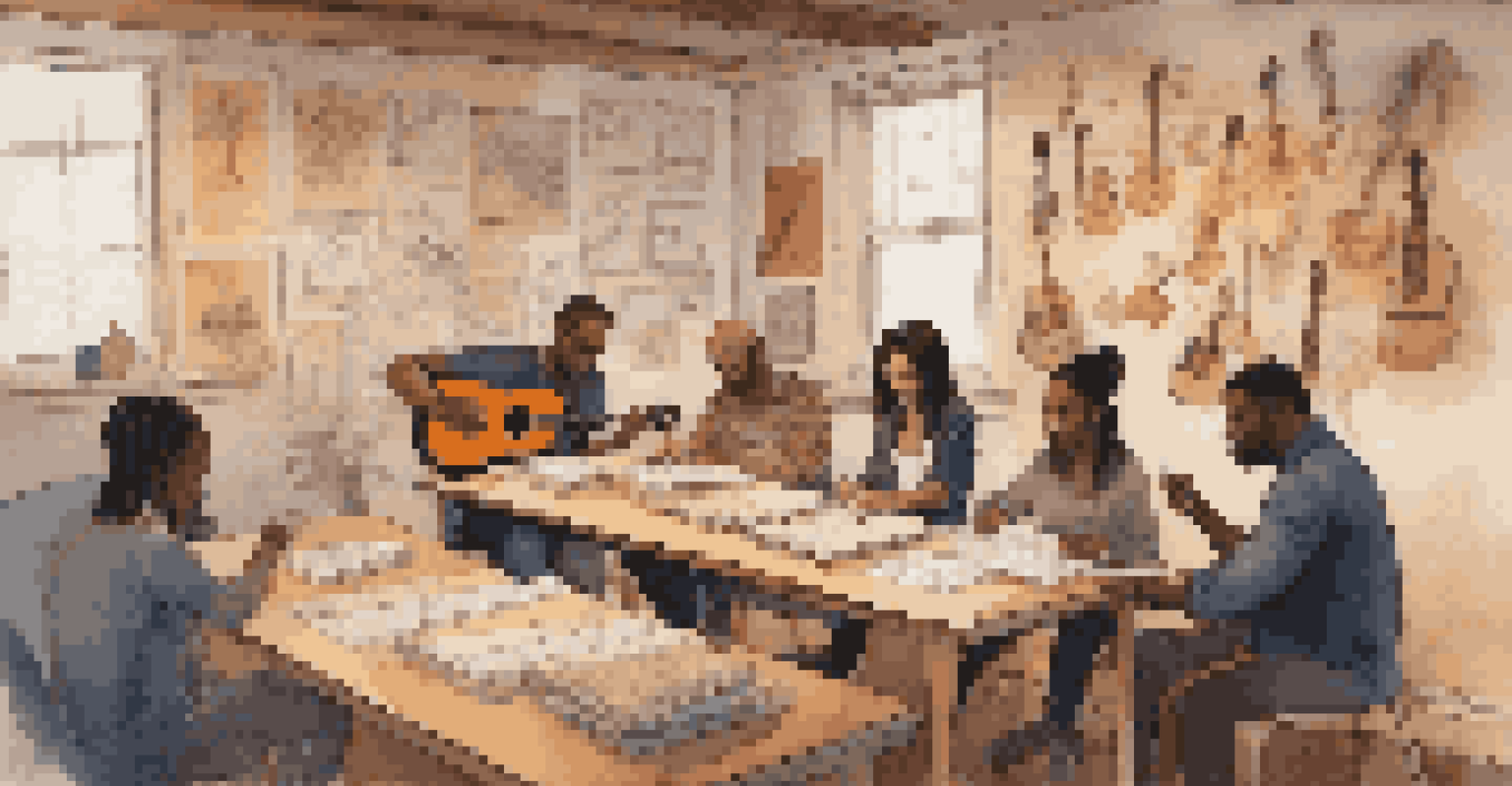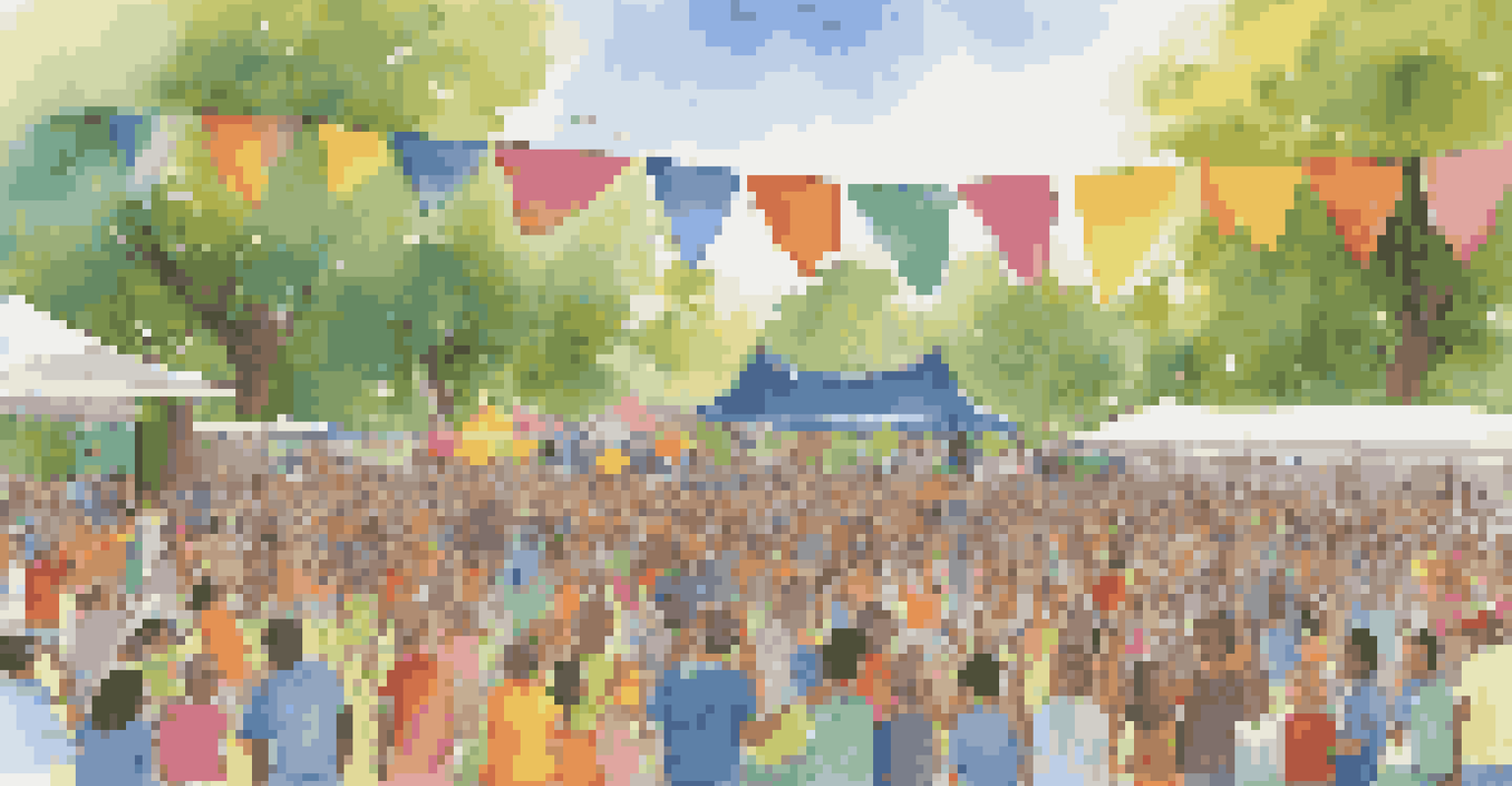The Use of Music in Conflict Resolution and Mediation

Understanding Music's Role in Human Communication
Music transcends language barriers, making it a universal form of expression. It can convey emotions and messages that words sometimes cannot capture. By tapping into this power, mediators can create a shared emotional space that facilitates understanding.
Music can change the world because it can change people.
In conflict situations, music can serve as a neutral ground, allowing parties to connect on a human level. This connection is vital in establishing trust, which is often lacking in disputes. For instance, a simple song can remind individuals of shared experiences or values, fostering a sense of unity.
Moreover, music can help in diffusing tension. Just as a lullaby can calm a crying baby, a soothing melody can ease the atmosphere in a heated discussion, opening the door for more constructive dialogue.
The Psychological Effects of Music in Conflict Settings
Research has shown that music can influence our emotions and behaviors significantly. In mediation, playing calming music can lower stress levels, allowing participants to approach discussions with a clearer mind. This psychological shift can lead to more productive conversations.

An example of this effect can be seen in restorative justice programs where music is used to create a peaceful environment. When victims and offenders listen to music together, it can soften their defenses and promote empathy, making it easier to work toward resolution.
Music Bridges Communication Gaps
Music serves as a universal language that transcends barriers, fostering emotional connections and understanding in conflict situations.
Furthermore, music can also evoke memories that remind individuals of their shared humanity. These memories can serve as a bridge, helping conflicting parties to remember that they are more alike than different, which is crucial for resolution.
Cultural Considerations When Using Music in Mediation
Culture plays a significant role in how music is perceived and experienced. What may be soothing for one group could be unsettling for another. Mediators need to be culturally aware and select music that resonates with all parties involved.
Where words fail, music speaks.
For example, in a mediation involving different cultural backgrounds, incorporating music that reflects each culture can help foster inclusivity. This practice not only acknowledges differences but also celebrates them, creating a richer dialogue.
Additionally, understanding the cultural significance of certain songs can enhance the mediation process. Songs tied to cultural identities can evoke pride and openness, which can be pivotal in overcoming barriers.
Using Music to Facilitate Dialogue and Expression
Music can serve as a catalyst for dialogue, encouraging participants to express their feelings and thoughts. By integrating musical elements like songwriting or rhythmic exercises, mediators can help individuals articulate emotions that may be difficult to verbalize.
For instance, a songwriting workshop during a mediation session can allow parties to express their grievances through lyrics, transforming negative feelings into creative outlets. This transformation can lead to breakthroughs in understanding and empathy.
Cultural Sensitivity Enhances Mediation
Integrating culturally relevant music in mediation can create inclusivity and promote a richer dialogue among diverse parties.
Moreover, sharing personal music choices can open up discussions about personal values and experiences. This exchange not only humanizes each party but also lays the groundwork for a more compassionate dialogue.
Case Studies: Successful Use of Music in Conflict Resolution
Numerous case studies highlight the effectiveness of music in conflict resolution. One notable example is the use of music in peace-building initiatives in war-torn regions, where community members come together to sing and perform, fostering unity and healing.
In another instance, the 'Songs of Peace' project in post-apartheid South Africa brought together diverse groups to create music, helping to mend racial divides. The collaborative nature of music-making became a symbol of reconciliation and hope.
These examples illustrate that music is more than just background noise; it can be a powerful tool for fostering understanding and reconciliation in deeply divided communities.
Challenges and Limitations in Using Music for Mediation
While music has many benefits in conflict resolution, it is not without challenges. Some individuals may have negative associations with certain types of music that can hinder the mediation process. It's essential for mediators to gauge the emotional responses of participants carefully.
Additionally, relying too heavily on music without addressing the core issues can lead to superficial resolutions. It's crucial that music is used as a complementary tool rather than a substitute for proper dialogue and negotiation.
Music as a Tool for Emotional Expression
Incorporating music into mediation can facilitate dialogue and allow participants to express feelings that may be difficult to articulate.
Moreover, logistical challenges, such as access to musical instruments or technology, can also limit the effectiveness of music in mediation settings. Mediators must be adaptable and creative in finding solutions that work for their specific context.
Future Directions: Integrating Music into Mediation Practices
As the field of conflict resolution evolves, integrating music into mediation practices presents exciting opportunities. Training mediators to use music effectively can enhance their skill set and offer new ways to engage conflicting parties.
Future research could explore the impact of various musical genres on conflict resolution outcomes. Understanding which types of music resonate best in specific contexts can help tailor approaches more effectively.

Ultimately, by recognizing music's potential as a tool for connection and communication, we can enrich mediation practices and foster more peaceful resolutions in conflicts across the globe.